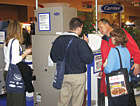
Mitchell Cropp, (left) president of Cropp-Metcalfe, Fairfax, Va., and Mike Housh, vice president of Airtron Heating & Air Conditioning, Cleveland, catch up on industry news at the ACCA Convention. A few days later, Cropp was inducted into the Carrier Hall of Fame during a Factory Authorized Dealer meeting.
His comment makes perfect sense, but implementing a compensation system in a contracting business is never quite as easy as it seems.
Collier shared the dais with Steve Saunders, a residential new construction contractor from the Dallas area. Kyle Gargaro, managing editor ofThe NEWS, moderated the discussion and directed questions from audience members during the 90-minute session.
Things started off with a bang as one audience member got a bit annoyed with one of Saunder’s early remarks during the session. Saunders quickly apologized and deftly explained that he was merely getting everyone’s attention with a very simple, but misunderstood fact regarding compensation systems - many contracting firms are unwittingly using illegal compensation practices and can find themselves in a court of law, if not in prison for such violations.
PERFORMANCE-BASED PAY
To begin the session, Collier clarified what is considered legal and what is not. The defining factor is that the total compensation divided by the total hours worked must be at least at the level of minimum wage. Though some attendees with obvious raised eyebrows were concerned about the legality of their own current pay plans, others in the room were more interested in whether performance-based pay actually enhances the quality and productivity of employees.One of the basic tenets of performance-based pay plans is that callbacks are unpaid time. For example, if a technician is called back to a job, that time is essentially unbillable, and therefore nonpaid. Performance-based pay plans are often accompanied by flat-rate pricing programs. If a job is estimated to be performed in two hours and the total pay to the technician for the job is $100, then whether the job takes one hour or three, the tech still is paid $100.

Carrier Corp. was one of the 115 vendors that showcased product at the 2008 ACCA Annual Conference and Indoor Air Expo. In total, nearly 1,000 people trekked to Colorado Springs, Colo. to take part in the convention. This was the 40th year the convention has been held.
“It works,” he said. “Nobody wants to get called back on Friday night to fix a mistake; the quality and productivity are great on Friday afternoons.” The expectation of a performance-based pay plan can be likened to having a lot of Friday afternoons on the work schedule.
Collier suggested the best way to implement performance-based pay is to set up the system to run in the background for a while. Compare the efficiencies the plan would yield compared to your current billing and payment plan. Then, bring your best employee in for a discussion. Put him on the plan for 30 days to see if it is feasible. When the program works for your best employee, it will work for everyone. “The system will actually weed out ineffective workers,” said Collier.
Saunders said, “We give new employees the choice of going on performance-based pay or regular hourly wage. Within a month they all switch over.”
Publication Date:03/17/2008


Report Abusive Comment